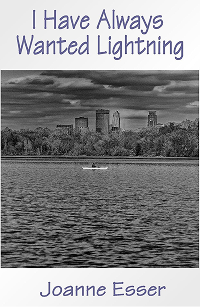Books
Nothing Is Stationary
Holy Cow! Press • 2026
Reading Joanne Esser’s latest work, Nothing Is Stationary, I am struck again and again with startled recognition. Here is life as I know it in all its fleeting glory and complexity but shimmering with new insight. This is a work in “praise of everything that does not last.” Exploring memory, boundaries, vacancies, and “spaces that admit light,” Esser offers us unexpected graces to ponder and treasure.
-Pamela Carter Joern, author of At the Corner of Past & Future
All We Can Do Is Name Them
Fernwood Press • 2024
In All We Can Do is Name Them, Joanne Esser sings of our innate fragility, our capacity for love and danger, and “what will remain.” She writes of the feminine generational generosity of spirit. With an eye that captures the body of earth, and also the body of the daughter, Esser is a poet of prayer, memory, and renewal. To read her is to find, for a moment, a place to rest.
-Lauren Davis, author of Home Beneath the Church
Humming At The Dinner Table
Finishing Line Press • 2019
At its deepest level, poetry accomplishes what might be called the ‘work of being’and Humming At The Dinner Table does just that. In poem after poem, Joanne Esser makes room for the richness of life, its complexity, its joys and griefs. The poems are grounded in moments that shine with the power of icons and cast their light on people, places, and moments that might otherwise have been lost to time. I love the way this book calls out to its readers, its unpretentious wisdom and its fierce attention to the telling detail.
-Jim Moore, the author most recently of Underground: New and Selected Poems
I Have Always Wanted Lightning
Finishing Line Press • 2012
In Joanne Esser’s poem, “Lessons from a Yorkshire Autumn Sky,” she writes: “I want to trust the transit of the sky,/believe in its benevolence.” Reading Esser’s first collection, I Have Always Wanted Lightning, I discover elegant and deeply felt poems that insist I contemplate my own relationships with trust and benevolence, with nature’s bounty, and with the complicated feelings we have about abundance and scarcity. Later in her book, the poet reminds us that when we shape ourselves into “that curl of self-protection” something big and important about the world and ourselves gets lost. I am moved by these fine lyric poems, with Esser’s confident and self-assured voice on the page. She asks us to trust her poet’s eye, her way of perceiving and making meaning in a world where none of us can predict the future, or love, or the idea of beauty lasting, and it is easy to trust this voice and the images she creates to claim her version of life through her poems.
– Deborah Keenan, author of eight collections of poetry.
Her latest, Willow Room, Green Door: New and Selected Poems, was published by Milkweed Editions.




